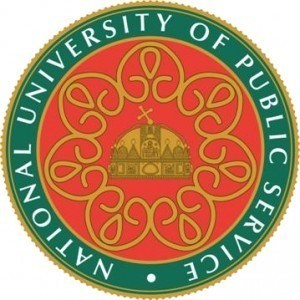Photos of university / #uni.nke
Military Sciences is a comprehensive and multidisciplinary program offered by the National University of Public Service, designed to prepare students for challenging careers in defense, security, and military leadership. This program provides a solid foundation in strategic studies, defense policy, military history, and operational tactics, equipping graduates with the analytical skills and practical expertise necessary to excel in various roles within national and international security institutions. Students will engage in rigorous coursework that combines theoretical knowledge with hands-on training, including simulations, field exercises, and specialized military technologies. The curriculum emphasizes leadership development, ethical decision-making, crisis management, and international cooperation, preparing students to operate effectively in complex and dynamic environments. Throughout the program, students will have opportunities to collaborate with military professionals, participate in internships, and attend lectures from renowned experts in the field of security studies. The program also fosters research activities aimed at developing innovative solutions to contemporary security challenges and contributes to policy formulation at national and European levels. Graduates of the Military Sciences program will be well-equipped for careers in military service, defense administration, homeland security, international peacekeeping missions, and related fields. They will possess critical thinking skills, strategic planning abilities, and a deep understanding of the legal, political, and technological aspects of modern warfare. The program’s interdisciplinary approach ensures that students gain a holistic view of security issues, preparing them to become effective leaders and problem-solvers in the ever-evolving landscape of global security.
The Doctoral School of Military Sciences focuses on the questions of military science regarding the activities of the defence sphere. This includes a wide spectrum of research fields from military history through security theories, defence administration to national security.
Although the doctoral programme of the School is primarily based on certain accredited MSc programmes of the National University of Public Service, the law on higher education enables the admission of graduates of other universities and with a scientific background related to military sciences.
The Doctoral School of Military Sciences focuses on 8 areas of research:
- Security Studies
- Sociological Issues of Defence
- General Theory of Military Science
- Theory of Defense Management
- Theory of Military Arts
- Defence Logistics and Defence Economy
- National Security and Law Enforcement
- Defence Informatics and Communication Theory"
The training of the Doctoral School is available in the following forms:
• organised training
- full-time training (funded by scholarship or individually through tuition fee)
- part-time (funded individually through tuition fee)
- individual training (funded individually through tuition fee)
• individual preparation
In general, the language used in the doctoral training is Hungarian, however, in case of foreign citizens English language training is also available. The training lasts 6 semesters and applies the system of credit points. In order to successfully end their training and receive their leaving certificate (absolutory) by the end of the 6th semester, PhD students must obtain at least 180 credit points in accordance with the following criteria:
- study obligations (min. 50 credits)
- scientific research work (min. 120 credits)
- holding lectures (max. 10 credits)
The Doctoral School is in close cooperation with the Ministry of Defense, the Hungarian Defense Forces and with other organisations (e.g. the Hungarian Association of Military Science) which participate in researches related to military sciences.
The international scientific recognition of Doctoral School can be most easily demonstrated by the fact that the number of foreign students is increasing year after year. In recent years foreign students who have successfully ended their PhD studies came from France, Italy, the People’s Republic of China, Slovenia, Ukraine and the United States.
(1) Students enrolled in an organised programme may pursue their studies in organised full-time
(funded from scholarship or self-paid) or in organised part-time (self-paid) or in an individual
programme.
13
(2) In an organised PhD programme, the period available for the fulfilment of the obligations set
forth in these Regulations equals up to six semesters, and, in respect of programmes funded from
a scholarship, the scholarship will be disbursed for up to six semesters.
(3) The doctoral schools may permit the interruption of a study period on up to three occasions, for
a total period of three years (leave of absence for an academic year). The interruption of the
student status at one time may exceed two semesters. A student may only interrupt a study
programme after the successful completion of the first semester. An application for suspension
must be accepted on the first occasion. During the suspension of the student status, state
scholarship may not be disbursed.
(4) The student status is also suspended if the student is unable to fulfil his or her obligations arising
from the student status due to childbirth, accident, illness or any other unexpected cause (long-
time study abroad), through no fault of his or her own. The restrictions described in paragraph
(3) do not apply in the cases set forth in this paragraph. The student shall be bound by a
notification requirement also in this case.
(5) With regard to all types of PhD programmes, the meeting of the requirements involving work
time, set as a precondition for obtaining the doctoral pre-degree certificate must be measured in
study points (credits).
(6) An organised programme assists a PhD student in acquiring the knowledge and the individual
research experience required for obtaining a PhD degree. To this end, a PhD student participated
in academic courses, performs individual research activities and may also undertake lecturing
tasks.
(7) A three-year programme consists of six active semesters. Over the course of the programme, at
least 180 credits must be obtained in total. In the period of coursework, a PhD student may take
up, with no additional tuition fees required, subjects of a credit value exceeding the total number
of credit required by 10 per cent. Thus, on completion of the programme, a total of 198 credits
may be recognised on his or her part.
(8) The units of a PhD programme, the minimum and expected number of credits that may be
obtained in each module, the academic requirements and those relating to scientific research
work and lecturing must be set forth in the academic and examination regulations of doctoral
schools (DS AER).
(9) Rules relating to concurrent programmes and foreign studies must be set forth in the academic
and examination regulations of doctoral schools.
(10) The rules relating to the recognition and accounting of credits obtained by a student enrolled in a
PhD programme for subjects taken in the doctoral school of another faculty or institute must be
set forth in the academic and examination regulations of doctoral schools. With regard to credit
recognition, the provisions of the Diploma and Credit Recognition Regulations of the University
must be also applied.
(11) The planning and reporting obligations of a PhD student and his or her supervisor, the scheme of
testing the knowledge of a PhD student and the order of examination period must be set forth in
the academic and examination regulations of doctoral schools, in accordance with the university
rules.
(12) Each PhD student, with the exception of those individually preparing for the degree, shall
possess a statement of acceptance issued by the department that gives lectures and performs
research in the given research subject, signed by the head of the given department.
The financing of the Military Sciences program at the National University of Public Service is primarily supported through a combination of state funding, tuition fees, and government grants dedicated to higher education and military training. As a public university in Hungary, the National University of Public Service benefits significantly from state subsidies aimed at developing national security and defense capabilities. These subsidies are allocated by the Hungarian government based on strategic priorities and the university's contribution to public service education. Tuition fees for the Military Sciences program are determined by the university's regulations and are designed to be affordable for both Hungarian and international students, with additional financial support options available to eligible students.
Students enrolled in the program may also have access to government-sponsored scholarships and financial aid packages, which can cover a portion of their tuition costs and living expenses. The university actively collaborates with military and defense institutions, which sometimes provide additional funding or in-kind support for students undertaking specialized military training components within the program. Furthermore, research grants obtained through national and European Union sources contribute to the program's development and enhancement, ensuring curriculum relevance and access to advanced training resources.
The university practices transparent financial management of the program, ensuring funds are utilized effectively to provide high-quality education, state-of-the-art training facilities, and military equipment necessary for practical training. Students are encouraged to explore various governmental and military-funded scholarship options, which may include stipends or allowances for service or training commitments post-graduation. The university's strategic goal is to sustain a financially viable program that offers excellent educational value while aligning with national defense priorities. Overall, the program’s financing structure aims to ensure long-term stability, promote accessibility, and support the high standards of military education required for national security roles.
Military Sciences degree program at the National University of Public Service offers comprehensive education designed to prepare students for leadership roles within armed forces and related agencies. The curriculum combines theoretical knowledge with practical skills, focusing on strategic planning, defense management, security policy, and military technology. Students are exposed to a broad range of disciplines including international security, military history, law of armed conflict, and modern warfare techniques. The program emphasizes development of leadership qualities, decision-making abilities, and ethical standards essential for military professionals.
Throughout their studies, students participate in rigorous coursework, simulation exercises, and field training, fostering a deep understanding of military operations and organizational structures. The program also provides opportunities for internships and collaboration with national security agencies, ensuring graduates are well-equipped for real-world challenges. Specializations within the program may include defense policy, strategic studies, and military technology, allowing students to tailor their education according to their interests and career goals.
Faculty members are experienced military professionals and academics who bring practical insights into the classroom. The university's facilities support hands-on learning with state-of-the-art training grounds and simulation labs. Graduates of the program are eligible for various careers in the armed forces, defense sectors, and governmental security agencies, where they can contribute to national security and defense strategy. The program adheres to international standards and encourages students to develop a global perspective on military and security issues.
Overall, the Military Sciences program at the National University of Public Service aims to produce highly competent, ethical, and innovative military leaders capable of addressing contemporary security challenges at both national and international levels.

